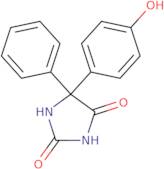5-(4-Hydroxyphenyl)-5-phenylimidazolidine-2,4-dione
CAS: 2784-27-2
Rif. 3D-FH131980
| 1g | Fuori produzione | ||
| 2g | Fuori produzione | ||
| 5g | Fuori produzione | ||
| 10g | Fuori produzione | ||
| 500mg | Fuori produzione |
Informazioni sul prodotto
- 2,4-imidazolidinedione
- 5-(4-hydroxyphenyl)-5-phenyl-
- (Hydroxyphenyl)phenylhydantoin
- (p-Hydroxyphenyl)phenylhydantoin
- 2,4-Imidazolidinedione, 5-(4-hydroxyphenyl)-5-phenyl-
- 2,4-Imidazolidinedione, 5-(4-hydroxyphenyl)-5-phenyl- (9CI)
- 4-Hydroxydiphenylhydantoin
- 4-Hydroxyphenytoin
- 5-(4-Hydroxyphenyl)-5-phenyl hydantoin
- 5-(4-Hydroxyphenyl)-5-phenyl-2,4-imidazolidinedione
- Vedi altri sinonimi
- 5-(p-Hydroxyphenyl)-5-phenylhydantoin
- 5-Phenyl-5-p-hydroxyphenylhydantoin
- Ccris 7051
- Hpph
- Hydantoin, 5-(p-hydroxyphenyl)-5-phenyl-
- Hydroxydiphenylhydantoin
- Hydroxyphenytoin
- Nsc 156081
- dl-5-(p-Hydroxyphenyl)-5-phenylhydantoin
- p-Hydroxydiphenylhydantoin
- p-Hydroxyphenytoin
- para-Hydroxyphenytoin
5-(4-Hydroxyphenyl)-5-phenylimidazolidine-2,4-dione (PPI) is a potent inducer of the cytochrome P450 enzyme system. This drug is metabolized to phenytoin, which is used for the treatment of epileptic seizures. PPIs are also used to treat diabetic neuropathy and other conditions. PPIs are potent inducers of the cytochrome P450 enzyme system and can induce hepatic drug metabolism, leading to an increased risk for drug interactions. PPIs have been shown to be effective against hypersensitivity syndrome, human serum albumin, and monoclonal antibody preparations in vitro.





